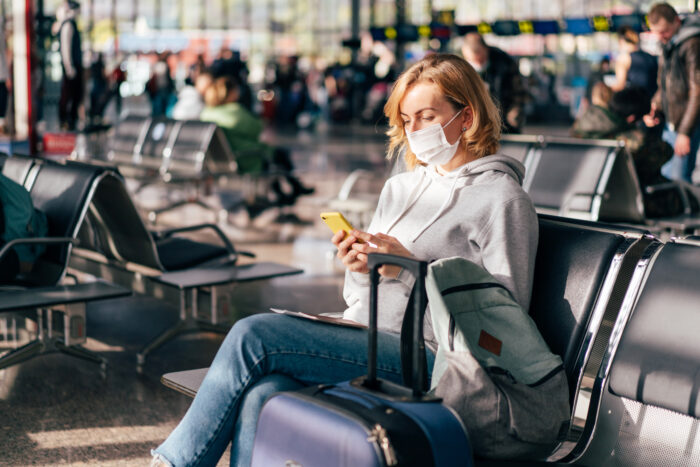Top Class Actions’s website and social media posts use affiliate links. If you make a purchase using such links, we may receive a commission, but it will not result in any additional charges to you. Please review our Affiliate Link Disclosure for more information.

While rising COVID-19 vaccination rates have increased travelers’ comfort levels, most Americans are choosing to stay home this holiday season.
Nearly 55 million people in the United States were expected to travel for Thanksgiving, but Christmas might be another story.
According to a survey commissioned in November by the American Hotel & Lodging Association, 33% of people are likely to travel for Christmas — which would be an increase from 24% in 2020.
Of these travelers, 66% plan to stay with family or friends, while 23% plan to stay in a hotel.
Plans may shift, though, as the COVID-19 situation in the country worsens following the emergence of the omicron variant.
According to a study from Scott’s Cheap Flights, 87% of people are still going ahead with holiday travel plans in light of the new variant, while 10% canceled or postponed their plans, and 3% changed their destination.
The US is currently averaging more than 100,000 confirmed COVID-19 cases on a seven-day moving average, with the new omicron variant spreading, experts say these numbers will undoubtedly increase.
“We will surely see a surge in cases with holiday travel this year; we are already seeing a surge after Thanksgiving. The key challenge is the very active spread of the delta variant in many parts of the U.S. right now. Omicron is even more contagious so it will also add to a January surge though no one can predict how large that will be,” Dr. Eric Schneider, MD Senior Vice President for Policy and Research at The Commonwealth Fund told Top Class Actions.
The new variant, which was first identified in southern Africa, seems to be much more transmissible than past variants. The World Health Organization has designated omicron as a “Variant of Concern” due to its “large number of mutations, some of which are concerning.”
Many countries, including the U.S., were quick to ban travel from southern African countries and implement new travel restrictions, yet the variant has continued to spread around the world.
So far, it has been detected in more than 20 U.S. states, according to the Centers for Disease Control and Prevention.
In what seems like a never-ending and constantly-evolving pandemic, it’s likely people are beginning to wonder when it will ever be safe again to travel normally and see friends and family without worry.
“Indoor family gatherings pose the greatest risk for infection because people tend to be less cautious among family and activities like eating, drinking, and talking indoors can create the perfect conditions for spreading the virus,” Dr. Schneider told Top Class Actions.
The WHO has urged at-risk groups not to travel to areas with community transmission, including people who aren’t fully vaccinated and are at increased risk of developing severe disease or dying, like those aged 60 years or older.
“Vaccination will mitigate the number of infections and above all severity. Yet, the omicron variant appears to reduce the protection against infection from vaccines. We need to vaccinate, boost, avoid poorly ventilated crowded spaces, and wear masks. I would recommend people to reduce travel this winter,” Dr. Jorge Salina, professor of medicine (infectious diseases) at Stanford University told Top Class Actions.
In total, 71.5% of the U.S. population has received at least one dose of a vaccine, and 60.5% are fully vaccinated. Only 24.9% have received a booster shot so far, according to the CDC.
“With other variants, like delta, vaccines have remained effective at preventing severe illness, hospitalizations, and death. The recent emergence of omicron further emphasizes the importance of vaccination and boosters,” the CDC said.
Schneider said everyone who is eligible should be vaccinated and receive a booster shot prior to holiday travel.
“If gathering with more than a few people, or when gathering with someone who is elderly or has a compromised immune system, rapid testing the same day can reduce the risk,” Schneider told Top Class Actions. “Anyone who has a positive rapid test should not gather with others for at least ten days. Wearing masks, meeting outdoors, opening windows, and using fans to increase air circulation are all helpful ways to reduce the risk.”
If you are considering traveling for the holidays, visit the CDC’s travel page to help make a decision about what is best for you and your family. The CDC still recommends delaying travel until you are fully vaccinated.
[getsocial app=”sharing_bar”]
Don’t Miss Out!
Check out our list of Class Action Lawsuits and Class Action Settlements you may qualify to join!
Read About More Class Action Lawsuits & Class Action Settlements:
- How Supply Chain Problems Are Impacting Holiday Shopping
- Astroworld Festival Victims Seek More Than $3B as Lawsuits Rapidly Pile Up
- Vaccine Mandate Opposition Has Limited Courtroom Success; Supreme Court May Weigh In Soon
- ‘And then next thing you know, we ran out completely’: the Colonial Pipeline debacle and what it means in the age of ransomware
ATTORNEY ADVERTISING
Top Class Actions is a Proud Member of the American Bar Association
LEGAL INFORMATION IS NOT LEGAL ADVICE
Top Class Actions Legal Statement
©2008 – 2024 Top Class Actions® LLC
Various Trademarks held by their respective owners
This website is not intended for viewing or usage by European Union citizens.















19 thoughts onHow Much Does the Omicron Variant Change Things for Holiday Travel?
add me
Please add me
add me please
Please add me
Add me to list pls . I travel alot.
Please add me.
PLEASE ADD ME
PLEASE ADD ME!!